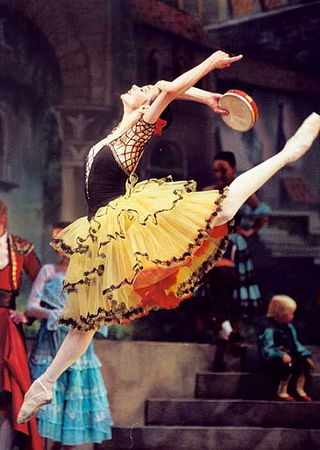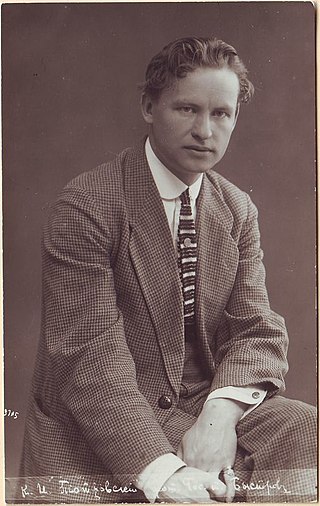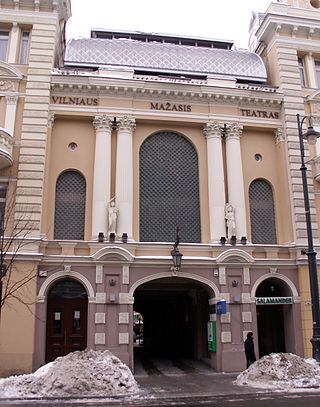
Vilnius, previously known in English as Vilna, is the capital of and largest city in Lithuania and the second-most-populous city in the Baltic states. The city's estimated July 2024 population was 605,270, and the Vilnius urban area has an estimated population of 708,627.

Regimantas Adomaitis was a Lithuanian film and stage actor. He was also active in Russia and Germany.
Vytautas Kernagis was a Lithuanian singer-songwriter ("bard") actor, director, and television announcer. He is considered to be a pioneer of Lithuanian sung poetry.
Saulius Mykolaitis was a Lithuanian director, actor, and singer-songwriter (bard).

Lithuanian National Opera and Ballet Theatre (LNOBT), founded as Operos vaidykla, is an opera house and ballet theatre in Vilnius, Lithuania.
Rimantė Valiukaitė is a Lithuanian actress. She has finished Vilnius 54th High School. During 1988–1992 she studied acting in Lithuania music academy. In 1990 she started working in Lithuania National Drama Theatre.

The Lithuanian State Symphony Orchestra is one of Lithuania's two national orchestras, founded in 1988. The other, the Lithuanian National Symphony Orchestra was founded in 1940.

The Lithuanian National Symphony Orchestra is one of Lithuania's two national orchestras, and was founded in 1940. Melodiya records with Lithuanian conductors and Lithuanian music released during the Soviet era indicate on label and sleeve the LTSR Valstybinis filharmonijos simfoninis orkestras which seems to have been the official name of the orchestra in Soviet times.

Old Theatre of Vilnius, built in 1913 as Pohulanka Theatre and formerly known as Russian Drama Theatre of Lithuania and other names, is a theatre in the Old Town of Vilnius. It is the only professional theatre in Lithuania that stages performances in Russian.

Eglė Špokaitė is a Lithuanian ballet dancer, most notably a Principal Ballerina for the Lithuanian National Opera and Ballet Theatre (1989–2011) and the only ballet dancer on the List of Famous Lithuanians. She co-founded the Egle Špokaitė Ballet School in Vilnius, Lithuania (2008), where she also served as artistic director. In the United States, she founded the Ballet Institute of San Diego dance school (2016). Špokaitė is also a choreographer, actress, and public speaker. She's the winner of the Lithuanian National Prize, as well as numerous other awards and honors. She lives and works between San Diego, CA and Vilnius.

Kipras Petrauskas was a Lithuanian and Soviet operatic tenor, professor, and Lithuanian Association of Artists member. The national opera foundation is associated with him. He was married to Elena Žalinkevičaitė-Petrauskienė. In 1942, he was asked to hide a Jewish baby girl, Dana Pomeranz, which he and his wife agreed to do. To hide the girl better, he and his wife left the city, moving first to a Lithuanian village, and later to Austria and then Germany. In 1947, they came back to Lithuania, found Dana's parents, and gave her back to them.

Vytautas V. Landsbergis : Lithuanian writer, journalist, director of films and theater, children's book writer, son of Vytautas Landsbergis and father of Gabrielius Landsbergis.
Yana Ross is a Lithuanian-American director.

Grytė Pintukaitė is a Lithuanian portrait painter, member of the Lithuanian Artists' Association, and member of the Association LATGA - Lithuanian Copyright Society.

Rūta Society was a Lithuanian cultural society in Vilnius, then part of the Russian Empire, active from 1909 to the outbreak of World War I in 1914. It organized various events, including lectures, literary evenings, and musical performances, but it is most noted for its contribution to the development of the Lithuanian theater. In total, Rūta staged about 50 plays.

Severija Janušauskaitė is a Lithuanian stage and film actress, occasionally performing as a singer, composer, costume designer and fashion model. She is well known for her role in the drama film Star (2014), for which she received an Award for Best Actress at the Kinotavr Film Festival, a Golden Eagle Award for Best Supporting Actress as well as Nika Award and White Elephant Award nominations in several categories. Other popular works include the comedy film The Norseman (2015) as well as the TV series The Optimists and Babylon Berlin.

Juozas Miltinis’ Drama Theatre is a state theatre in the town of Panevėžys, Lithuania, approximately 130 km north of the capital Vilnius. It is the main place for drama in town with a permanent troupe of actors and large performing spaces. During the Soviet era the theater was well known across the Soviet Union for outstanding performances directed by Juozas Miltinis, a legendary personality, who led the theatre for decades. He worked with actors such as Donatas Banionis. Because of its noticeable impact on town's life and culture, the theater continues to maintain a distinct connection with its local audience. Since autumn 2017 a team of young theatre creators have been leading the theatre, who are focusing on developing the creative space, providing opportunities for experiments of emerging directors, allowing actors’ artistic abilities to evolve and creating new experiences for whole theatre team.
America in the Bathhouse is a three-act comedy by Keturakis. The play was first published in 1895. It became the first Lithuanian-language play performed in public in present-day Lithuania when a group of Lithuanian activists staged it on 20 August 1899 in Palanga. The play depicts an episode from the everyday life of the Lithuanian village – a resourceful man swindles money from a naive woman and escapes to the United States. Due to its relevant plot, small cast, and simple decorations, the play was very popular with the Lithuanian amateur theater. It became one of the most popular and successful Lithuanian comedies of all time and continues to be performed by various troupes.

Barn theatre is a tradition in Lithuania to stage amateur theatre performances and music concerts in barns.
Kęstutis Cicėnas is a Lithuanian theatre, film and television actor.
















